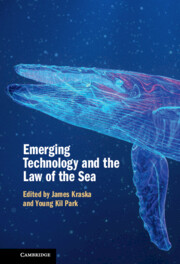Book contents
- Emerging Technology and the Law of the Sea
- Emerging Technology and the Law of the Sea
- Copyright page
- Contents
- Contributors
- Preface
- 1 Emerging Technology and Maritime Boundary Dispute Resolution
- 2 Renewable Energy and the Law of the Sea
- 3 Striking an Equitable Balance under the Biodiversity Agreement
- 4 Small Modular Reactors and Transportable Nuclear Power Plants
- 5 Shipping, Distributed Ledgers and Private Maritime Law
- 6 Maritime Cyber Security
- 7 International Standards for Hull Inspection and Maintenance of Robotics and Autonomous Systems
- 8 Functionalism and Maritime Autonomous Surface Ships
- 9 Artificial Intelligence to Facilitate Safe Navigation of Ships
- 10 Unmanned and Autonomous Warships and Military Aircraft
- 11 Seabed Technology and Naval Operations on the Continental Shelf
- Index
8 - Functionalism and Maritime Autonomous Surface Ships
Published online by Cambridge University Press: 07 July 2022
- Emerging Technology and the Law of the Sea
- Emerging Technology and the Law of the Sea
- Copyright page
- Contents
- Contributors
- Preface
- 1 Emerging Technology and Maritime Boundary Dispute Resolution
- 2 Renewable Energy and the Law of the Sea
- 3 Striking an Equitable Balance under the Biodiversity Agreement
- 4 Small Modular Reactors and Transportable Nuclear Power Plants
- 5 Shipping, Distributed Ledgers and Private Maritime Law
- 6 Maritime Cyber Security
- 7 International Standards for Hull Inspection and Maintenance of Robotics and Autonomous Systems
- 8 Functionalism and Maritime Autonomous Surface Ships
- 9 Artificial Intelligence to Facilitate Safe Navigation of Ships
- 10 Unmanned and Autonomous Warships and Military Aircraft
- 11 Seabed Technology and Naval Operations on the Continental Shelf
- Index
Summary
The chapter proposes a novel interpretative account that functionally constructs the UNCLOS requirement of ship manning. The legal rationale underlying the argument in favor of functional flexibility is informed by the international regulatory developments at the level of the International Maritime Organization and considers that technological progress is best served by the emerging law-making philosophy of setting goal-based standards. The posited methodology further proposes that the functional interpretation of manning shall be linked to a test for reviewing the flag state margin of discretion in the context of the obligation to take measures toward achieving and maintaining comprehensive safety at sea for autonomous ships.
Keywords
- Type
- Chapter
- Information
- Emerging Technology and the Law of the Sea , pp. 214 - 242Publisher: Cambridge University PressPrint publication year: 2022

